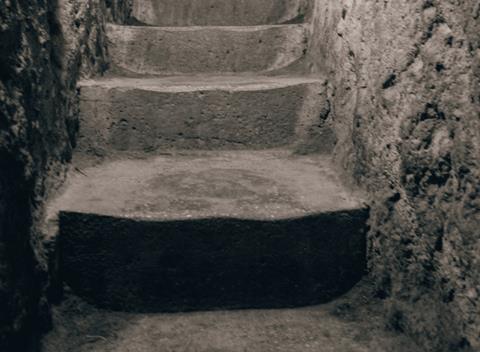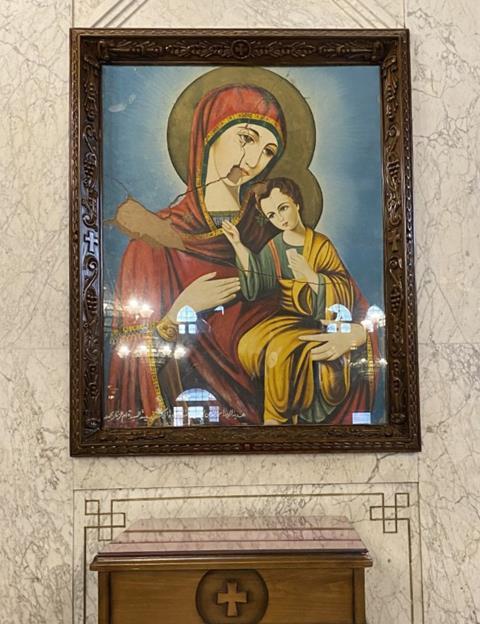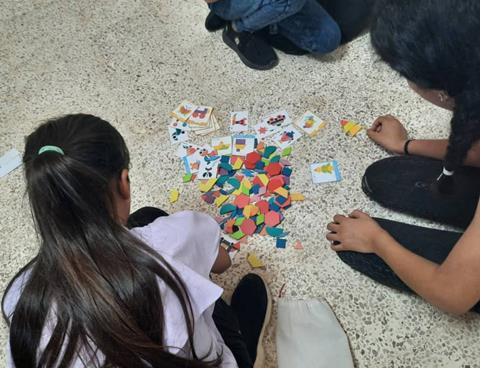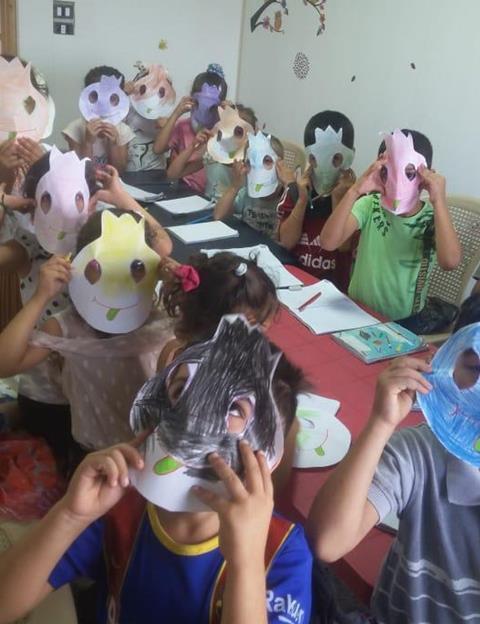Samara Levy first introduced us to the charity God stirred her to set up, which serves the Middle East with medical and humanitarian help, in July 2021. She is now back, sharing the stark reality of life for Syrians and challenging us all to contemplate the true cost of forgiveness

The black, stone church gave no indication of what lay beneath it. Sunken stone steps descended to a discreet basement door. Moving through it, we discovered that this was no ordinary crypt: regimented, dressed stone walls plunged into an irregular, constricted stairwell.
Stooping to enter the passage, our arms almost scraped the narrow walls. Hand-carved into the subterranean rock, the tight corridor yielded additional tunnels and stairways forming acute angles and bends – each one a surprise as we shuffled through the warren of catacombs formed naturally in the stone. The astonishing, natural warmth contrasted starkly with the chilly December air above ground.
Reaching a circular cavern – with a ceiling no higher than a tall man’s head – this vault was hand-sculpted by our spiritual predecessors; unlike the natural honeycomb hollows we had passed on our descent. This tiny, clandestine, underground church has been used by early Christians since AD 59 to pray and worship secretly: the generation who remembered Jesus first hand. Stirred deeply by its necessity, I contemplated the 2,000 years of persecution suffered by Syrian Christians.
The church above, built in AD 476, bore scars illustrating the price of being a Christian even now. Sacred icons of Jesus and the mother of God had been rehung on the walls, which were desecrated by jihadists who murdered the residents in this district, then occupied their homes – even in this decade.
Yet the cracks and missing sections in the icons couldn’t even hint at the depravity our siblings in Christ suffered: being driven from their homes, robbed, kidnapped, tortured, ransomed, raped, enslaved and slaughtered.
Even children. One priest stayed, with a few other Christians, to protect the church and its altar; sacred objects – including a belt worn by Mary, after which this church was named – and icons that adorned the church. Those remaining Christians became slaves and human shields to the occupying jihadists, who torched the church then martyred the priest before they were ousted.
The building has been restored in the few years since; the dignity and composure of these Christian humbles me. Since 2018 I have met hundreds in Syria who have suffered chilling atrocities. I have seen their sorrow-filled eyes, held their shaking bodies as their tears flowed, and listened as they described their terrifying ordeals, including watching loved ones being kidnapped or executed.

The supernatural nature of forgiveness
We Christians understand our mandate to forgive, but most western Christians have no personal experience of the extreme persecution or martyrdom that has stolen the lives of innumerable Syrian Christians since Jesus and his apostles were persecuted to death.
Forgiveness is a spiritual act requiring incredible grace if we have personally suffered heinous violations. But forgiving those who have viciously abased someone we love needs grace on a whole new level. How does the child who watched his father being tied to a car then dragged behind it until his bloody body died, begin to forgive the Islamists who caused, laughed and jeered at his agony during his protracted death?
How does the mother of a teenage girl forgive the jihadists who kidnapped her daughter, torturing and repeatedly gang raping the girl while calling her parents, making them hear her cries as they violated her for hours, even days, before killing or dumping her, like a piece of worthless rubbish?
Forgiveness, in the harshest of circumstances, is only possible through the Holy Spirit touching the deepest part of our soul: it is a supernatural act.
I have also visited the jihadists. By then surrendered and crowded into secure, dismal camps where hours stretched into days, weeks, then months, they were reduced to nobodies with nothing.
We supported their families too; their children were illiterate and their lives shambolic and dysfunctional. Casualties too in this spiritual battle, some were deceived by fundamentalist ideological teaching; some were attracted by money or power. Others were pressured through fear when their neighbourhoods fell to the control of armed radicals.
What would happen to their children if they didn’t support the de facto armed authorities who reigned with terror? They too lost homes and loved ones in the counter attacks. They lost themselves. Few acknowledge what they have done. Nevertheless, Jesus loves and died for us…and them. Equally. They form part of the Syrian community, which must be rebuilt.
It is an incredibly bold undertaking to bring the orphans and widows from both sides together. Multitudes still live in neighbouring villages and districts, side by side – segregated by distrust; each with its own shops, services and schools. Most live in poverty. In our two outreach centres, the most vulnerable from each side come to eat, play, learn and train together. We are called to reconcile these fractured, bereaved communities.


Providing care to the desperate and forgotten
What started as a call from God in 2014 to send one lorry of winter aid to people fleeing ISIS quickly snowballed into a nationwide appeal, resulting in 113 lorries and containers of aid to the Middle East, including eleven ambulances.
This happened alongside the provision of four temporary field hospitals at different times in Syria. Samara’s Aid Appeal has provided aid to more than half a million people, and medical aid for more than 70,000.
We have also established two permanent centres supporting orphans and widows and have prepared two permanent Christian medical centres, which will precede a larger hospital. Additionally, we have projects growing food and are planning a bakery to make bread for the poor.
Focusing on their greatest physical needs for food, clothing, education and training, we opened the first of our outreach centres for orphans and widows in 2020. There are 12.4 million people who have limited or uncertain access to adequate food in Syria – with famine looming – making the meals we provide for 120–200 vulnerable children every day essential.
Free, engaging education also attracts them: we provide specialist teachers focusing on all, especially key exam year groups. The role these centres play in reconciling Christian, Shia and Sunni orphans and widows is transformative. After the atrocities inflicted on each by the communities of the others, they have been enemies. In our centres, they see each other’s vulnerabilities, humanity and struggle for survival.
Our first centre filled up so quickly that we built another in a rural area in 2021. Although 90 per cent of children in Syria need humanitarian assistance now, no other organisations support the vulnerable in this area – where there are 2,500 registered widows and families raising orphans, many in extreme poverty. In the first two weeks of opening our centre, the orphans attending multiplied rapidly.
Some days more than 30 unexpected children came, over and above the 40–50 expected. Some walked kilometres alone, propelled by the promise of food, free education, activities and a loving welcome. For orphans left with relatives who don’t want or can’t cope with them, or who are ostracised by their communities, our team’s warmth and provision is something new: these children are hungry for food, education and love.
Our work relies on the participation of the UK body of Christ. For information about collecting aid through your church, school or community, to demonstrate love in action to vulnerable orphans and children in Syria, visit samarasaidappeal.org; we need: new clothes and shoes; school bags; educational and hygiene items.
Samara Levy is the founder and CEO of Samara’s Aid Appeal, which provides medical and humanitarian aid in Syria (samarasaidappeal.org). She is the author of Rebuilding the Ruins (Hodder & Stoughton), which tells her own story, and Up From the Ashes (Hodder & Stoughton), the inspiring testimony of a Syrian Christian doctor.




























No comments yet